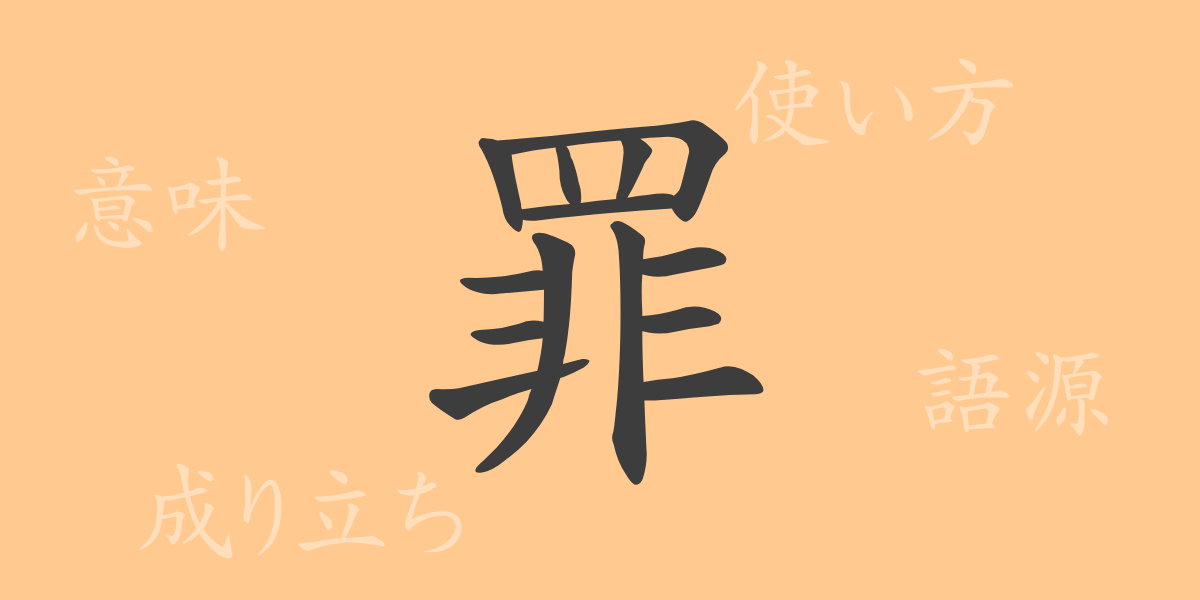The concept of “罪” (つみ, tsumi) has been shaped alongside human history through society and culture. This single kanji encompasses various aspects such as law, morality, and religion, influencing individual behavior and group norms. In this article, we delve into the complex world of “罪” (つみ, tsumi), exploring its origins, modern usage, and related idioms and proverbs.
Origins of 罪 (つみ, tsumi)
The origins of the kanji “罪” (つみ, tsumi) trace back to ancient China. In oracle bone script, it was represented by the combination of “罒” (あみがしら, amikashira), meaning “net,” and “非” (あらず, arazu), meaning “wrong.” This combination symbolized the act of being caught in a net, leading to the concept of a punishable act, or “sin.” Over time, the idea of sin became refined from legal and moral perspectives, becoming a fundamental rule in modern society.
Meanings and Uses of 罪 (つみ, tsumi)
The kanji “罪” (つみ, tsumi) primarily denotes legal violations or moral transgressions. It is commonly used to refer to criminal acts and their responsibility, making it a prevalent term in legal terminology. Additionally, “罪” (つみ, tsumi) is used metaphorically to describe feelings of guilt or religious concepts of sin, showing its wide range of applications.
Readings, Stroke Count, and Radical of 罪 (つみ, tsumi)
Here are the basic details about the kanji “罪” (つみ, tsumi):
- Readings: The on’yomi (音読み) reading is “ザイ” (zai), and the kun’yomi (訓読み) reading is “つみ” (tsumi).
- Stroke count: It has a total of 13 strokes.
- Radical: The radical is “网” (あみがしら, amikashira), meaning “net.”
Idioms, Phrases, and Proverbs Using 罪 (つみ, tsumi) and Their Meanings
There are numerous idioms, phrases, and proverbs in Japanese that include “罪” (つみ, tsumi). Here are a few examples with their meanings:
- 「罪滅ぼし」 (つみほろぼし, tsumi horoboshi): To atone for past sins by doing good deeds.
- 「罪悪感」 (ざいあくかん, zaiakukan): A feeling of guilt for having done something immoral or illegal.
- 「無実の罪」 (むじつのつみ, mujitsu no tsumi): Being accused of a crime one did not commit.
- 「罪を憎んで人を憎まず」 (つみをにくんでひとをにくまず, tsumi wo nikunde hito wo nikumazu): Hate the sin, not the sinner; a teaching that one should condemn the act, not the person who committed it.
Conclusion on 罪 (つみ, tsumi)
The kanji “罪” (つみ, tsumi) represents significant concepts used in various contexts such as law, morality, and religion. Understanding its origins, modern usage, and related idioms and proverbs is essential for comprehending the Japanese language. “罪” (つみ, tsumi) functions as a foundation for regulating individual behavior and maintaining social order, deeply rooted in our lives despite changes in culture and era.

























